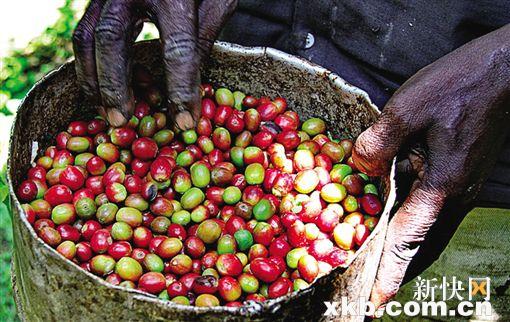Why do so few people drink coffee in Africa?

■ ripe coffee fruit that looks like a red cherry.
■ Liangzi
One thing I am very curious about is that coffee comes from Africa, but in many parts of Africa, especially in small towns and villages, few people drink coffee. But after a trip to Uganda, the hometown of coffee, this question can basically be answered.
There are many coffee farms in the village of Budadiri in Mombali, a small town near the Kenyan border in Uganda. Among them, coffee farmer Jaja Kate owns hundreds of thousands of coffee trees. September to December is the coffee harvest season. I follow him to pick red coffee beans on the coffee farm. At first glance, these ripe coffee beans look like small cherries, the color is very attractive.
Jaja Kate is very talkative and happy to live. He takes the children to pick coffee beans and sing songs. The whole family, like relatives, revolves around these coffee trees every day and knows the growth of each tree like the back of their hand.
According to Jaja Kate, the conditions of well-cultivated coffee trees are very strict: sunshine, rainfall, soil, climate and so on will affect the quality of coffee. Sunshine is an essential element for the growth and fruiting of coffee trees, but strong sunlight will also affect the quality, so at this time, we need the surrounding banana trees, mango trees and other help to block the sun in order to achieve a natural balance of sunshine.
Coffee originated in Ethiopia in Africa, and then moved to Yemen in the Arab region of the Middle East, so some people call it "Arabik". Then it spread to Java, Indonesia, and from there to Latin America. African coffee was previously grown in Congo, Uganda and other places, for Robster coffee, and a kind of coffee grew in Liberia, for Liberia. In 1753, Swedish botanist Carl van Linnay divided coffee into three original species: Arabica coffee (about 70% of the world's coffee), Roberts coffee (used to account for 25% of the world's coffee), and Liberica coffee, which is now almost unknown.
At present, the coffee grown by Jaja Kate belongs to Arabica coffee, which is also an excellent coffee bean, of course, it is related to the soil and temperature in this area. As a result, he was very proud, but when asked if he drank coffee, he said that it was only occasionally and not a daily necessity.
"since you deal with coffee beans all the year round, why don't you like coffee?" I asked him.
"although coffee beans originated in Africa, drinking coffee is not a hobby inherited by our ancestors. We didn't have baking skills. At that time, at best, we mashed the dried coffee beans by hand and added some boiled water to drink. In fact, we like to chew sun-dried coffee beans best. Including in the national engagement and marriage ceremony, the woman's family is to send dried coffee beans to the man's family and connect the hearts of the two families with coffee fruits. This is our real traditional custom. "
Now I finally understand why coffee drinking is not as popular locally as in Europe and the United States. Of course, in addition to the more difficult baking technology, there is another very important reason. Local people make a living by selling coffee beans, so they are not willing to drink high-quality coffee beans themselves. Moreover, people can also appreciate the pleasure of chewing coffee beans without losing the aroma of caffeine.
Finally, I had a chance to participate in the engagement ceremony of the Buganda people. In the last item of the ceremony, the woman's parents really handed the dried coffee beans into the hands of the groom and his relatives. After that, everyone shared the joy of chewing coffee beans, which also indicates that the marriage can continue peacefully and beautifully.
(excerpt from the "ant beehive" network, the text has been abridged)
Important Notice :
前街咖啡 FrontStreet Coffee has moved to new addredd:
FrontStreet Coffee Address: 315,Donghua East Road,GuangZhou
Tel:020 38364473
- Prev

Coffee producing countries in Africa introduce where coffee is good in Africa.
1. Kenya Kenya grows high-quality Arabica coffee beans, which absorb almost the essence of coffee cherries, with a slightly sour, thick aroma, and are very popular among Europeans, especially in the United Kingdom. Kenyan coffee surpassed Costa Rican coffee and became one of the most popular coffee. With aromas of wine and flowers, the texture is full, small and round, because
- Next

African coffee producing countries where is the best coffee in Africa?
1. Kenya Kenya grows high-quality Arabica coffee beans, which absorb almost the essence of coffee cherries, with a slightly sour, thick aroma, and are very popular among Europeans, especially in the United Kingdom. Kenyan coffee surpassed Costa Rican coffee and became one of the most popular coffee. With aromas of wine and flowers, the texture is full, small and round, because
Related
- Detailed explanation of Jadeite planting Land in Panamanian Jadeite Manor introduction to the grading system of Jadeite competitive bidding, Red bid, Green bid and Rose Summer
- Story of Coffee planting in Brenka region of Costa Rica Stonehenge Manor anaerobic heavy honey treatment of flavor mouth
- What's on the barrel of Blue Mountain Coffee beans?
- Can American coffee also pull flowers? How to use hot American style to pull out a good-looking pattern?
- Can you make a cold extract with coffee beans? What is the right proportion for cold-extracted coffee formula?
- Indonesian PWN Gold Mandrine Coffee Origin Features Flavor How to Chong? Mandolin coffee is American.
- A brief introduction to the flavor characteristics of Brazilian yellow bourbon coffee beans
- What is the effect of different water quality on the flavor of cold-extracted coffee? What kind of water is best for brewing coffee?
- Why do you think of Rose Summer whenever you mention Panamanian coffee?
- Introduction to the characteristics of authentic blue mountain coffee bean producing areas? What is the CIB Coffee Authority in Jamaica?

